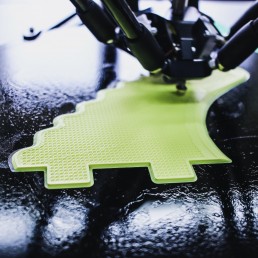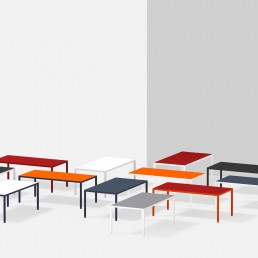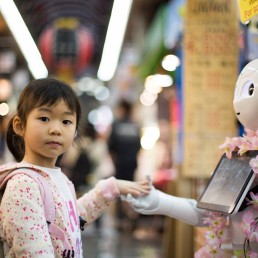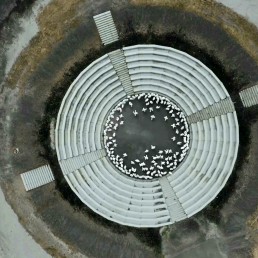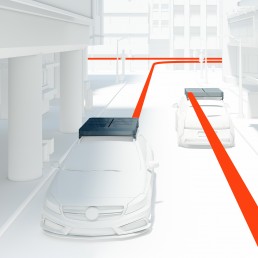Future of Work
How Is Digitalization Changing the Way We Work?
By Alicia Metz-Kleine, November 2018, Berlin
Digitalization is omnipresent. Buzzwords like “Work 4.0” and “New Work” have become established terms. Digitalization is here to stay, and it’s not only making our work and lives more sustainable, it’s also turning business models and objectives upside down. How will our work change when entire occupations and work fields are digitalized? How, when, where, and how much will we work? What does “New Work” mean?
Digitalization and “New Work”
When it comes to digitalization, New Work is usually not far away. It shows up in very different contexts: sometimes it’s about technology and sometimes the free choice of workplace and time. But what exactly is New Work?
The concept of New Work goes back to the American professor Frithjof Bergmann, who describes New Work as an alternative to the prevailing wage work system. Bergmann’s thesis is this: the job system is at an end and therefore people can free themselves from the bondage of wage labor. According to Bergmann, the central values of “New Work” are independence, freedom and participation in community.
And today? “New Work” can mean working less. But it can also mean working differently, namely collaboratively, self-determined, smart and connected. In other places; in other constellations; under new premises; and with new technologies. Thus, New Work is what we make of it. Independence, freedom and participation in community.
And therein lies a great opportunity for each and every one of us – but also for companies.
Indeed, New Work can actually make people happier and more productive – if companies actually dare to follow up these buzzwords with actions. With successful implementation, employees feel more effective. They can work more in line with their needs and life stages. They can work more collaboratively with their colleagues and are happier and more motivated. Flexible job opportunities lead to high commitment, which means less fluctuation, better innovative capacity AND increased productivity. In addition, New Work is an important prerequisite for successful digitalization. Sounds like win-win-win, right?!
Flexible? That’s relative.
But how flexible are organizations today? And what does work that really fits in with life look like?
Four out of five companies today already call themselves flexible, but it’s quickly become clear that flexibility is relative. The numbers from recent studies speak for themselves: 96% of young parents want more flexibility in their jobs; 75% of young fathers would like to work part-time for a while; 80% would like to organize their work in a more self-directed manner; and a startling 87% of all employees have mentally quit at their jobs.
The fact is, apart from the slightly lower number of hours, our working models have hardly changed since the days of industrialization. It still seems like a classic full-time job is the immutable standard.
Who decided that almost every task or job fits best in a 40-hour position? Isn’t it an absolutely crazy assumption? Outdated? Generalized? And incredibly inflexible?
However, the fact is that new environmental conditions and demands require new structures and fundamental cultural changes in companies. Flexibility and networking are the most important prerequisites for holistic digitalization. Only companies that make lasting changes to structures and working methods can survive in an increasingly complex digital market and be successful, innovative and creative in the next 5 years.
The solution? It’s easier than many think because companies usually already have everything they need to shape their digital transformation: their own employees. The required knowledge is already there, it only needs to be activated.
The “future of work?!”
Texts dealing with digitalization and New Work are often also about the “future of work.” That always sounds pretty far away, as if we still have a long time before this future overtakes us. However, this is a naive and, in some cases, dangerous thought, as all the changes that sound like daring visions of the future have long since begun. Things that were unimaginable a few years ago are already part of our everyday life today, whether we want it or not. Our work (world) is already in the midst of this change. And that’s good. That’s exciting. Because these changes offer opportunities and they can lead us to a more self-determined world of work. The future of work is not something that will show up at some point. It’s something that we can shape here and now. We all decide what it will look like. Therefore, we urgently need to ask: How do we want to live? How do we want to work?
Even companies should hurry to ask themselves some questions: How do we want to organize ourselves and distribute tasks? How do we want to communicate, and which values are particularly important to us in our collaborations? What should the rules of the game be for everyone? What does work that really fits into people’s lives (not the other way around) look like? How can we work together more collaboratively and transparently? How do we create spaces for trying things out, for experiments, for mistakes? And with which strategy can classical work structures be transformed in such a way that on the one hand they give people more flexibility, freedom, time and self-determination, and on the other hand companies have more knowledge, and more productive and well-networked employees?
Again, in the era of New Work and digitalization, we have a great opportunity to do just that: transform the world of work for and with people. This can lead us to a more self-determined, humane and flexible working world.
Let’s seize this opportunity! ■



